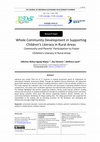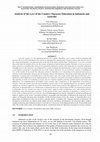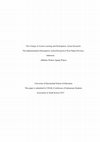Papers by Adhimas Wahyu Agung Wijaya

The Journal of Indonesia Sustainable Development Planning, Apr 29, 2022
Indonesia was ranked 72nd out of 77 countries in reading assessment based on Programme for Intern... more Indonesia was ranked 72nd out of 77 countries in reading assessment based on Programme for International Students Assessment (PISA). Through the National Literacy Movement, the Indonesian government attempt to increase children's reading proficiency, which is also an indicator of SDG 4.1.1. This study explores the important roles of the parents and community in improving children's literacy competencies. This study used a qualitative approach and collected both primary and secondary data. The findings highlighted that parents supporting children's literacy could improve children's reading interest and early-phase of reading competencies through the availability of reading corners and homebased literacy activities. There were 300 parents supporting children's literacy activities and 73 community facilitators facilitating 20 village reading clubs. The village government also supported the sustainability of the reading club by providing incentives for the facilitators and developing the infrastructure through village fund allocation.

Love the country is a very fundamental part of a country. Therefore, every country needs to maint... more Love the country is a very fundamental part of a country. Therefore, every country needs to maintain and increase the love of the homeland of its citizens to safeguard the ongoing state. Various experts state that the love of the country/nationalism is an important part of the life of the nation and the State. Furthermore, it was also revealed that at this time the attitude of love for the country in Indonesia had declined or faded. Therefore, it was necessary to find a solution to strengthen this character for guaranteed Indonesia country. This study aims to reveal the similarities and differences in the character curriculum of love country in Indonesia and Australia so that it can be an inspiration in developing a program to strengthen the love of the country character. As one of the best countries in building the love of the country in the world, the education system in Australia is very interesting to be analyzed and used as a reference in developing this character for developing countries like Indonesia. The design of this study generally used qualitative research with a grounded theory with descriptive type. The results of the study showed that there are 3 similarities and 6 differences in the implementation of a character education curriculum in Indonesia and Australia. The equation in terms of (1) planting concepts, the two countries together prioritize mutual respect and respect for differences; (2) commemoration of holidays, both countries have similarities in the application of learning by teachers, where the teacher gives the task of making certain works; (3) the implementation love of country, together students are invited to apply the love of the homeland in schools and around it. The difference lies in: (1) the main dimension, in Australia there are 3 dimensions, in Indonesia there are 5 main values of PPK; (2) organizing in schools, in Australia, love the country was enter in social science subjects, while in Indonesia were enter intracurricular, kokurikuler, and extracurricular activities; (3) the period of time, basic education in Australia is carried out in 7 levels, while in Indonesia there are 6 levels; (4) curriculum approach in schools, Australia is carried out with special subjects, namely social science consisting of history, geography and citizenship, in Indonesia the main focus on the subject of Pancasila education and citizenship; (5) the learning scheme of love the country, in Australia there are 4 main stages, in Indonesia it does not yet have a specific nature, it optimizes the "tripusat" function of education; (6) Evaluation, in Australia, are asked to make simple and clear conclusions. In Indonesia, the education office conducts regular monitoring and evaluation at least 1 (one) time in 1 (one) year on the Implementation in the Formal Education Unit. The results of this study can be followed up by constructing character education programs in various countries.

Indonesia was ranked 72nd out of 77 countries in reading assessment based on Programme for Intern... more Indonesia was ranked 72nd out of 77 countries in reading assessment based on Programme for International Students Assessment (PISA). Through the National Literacy Movement, the Indonesian government attempt to increase children's reading proficiency, which is also an indicator of SDG 4.1.1. This study explores the important roles of the parents and community in improving children's literacy competencies. This study used a qualitative approach and collected both primary and secondary data. The findings highlighted that parents supporting children's literacy could improve children's reading interest and early-phase of reading competencies through the availability of reading corners and homebased literacy activities. There were 300 parents supporting children's literacy activities and 73 community facilitators facilitating 20 village reading clubs. The village government also supported the sustainability of the reading club by providing incentives for the facilitators and developing the infrastructure through village fund allocation.

This study aims to describe: (1) the application of love, discipline, and honesty values in child... more This study aims to describe: (1) the application of love, discipline, and honesty values in children aged 4-6 years and (2) the supporting and inhibiting factors for the application of three-character values in children aged 4-6 years in Kanisius Kotabaru Kindergarten, Yogyakarta. This study is a qualitative research employing a phenomenological approach. Data collection was done through interviews, observation and documentation. The data were validated using triangulation between participation, documentation, observation, and interview. The results of the study are (1) How to apply the value of love, discipline, and honesty that is by habituating, exemplary, environmental conditioning, and increasing awareness of the behaviour and speech guiding that is done through (a) The application of the value of love is seen in each before and after the activity through pray. The application of love also can be found through children weekly devotion/ PIA (Pendampingan Iman Anak) activities ev...

This study aims to explore the role of parents and community to strengthening children literacy. ... more This study aims to explore the role of parents and community to strengthening children literacy. This study uses participatory action research (PAR) in applying qualitative data collection using interview, observation and document study. This study was conducted in Landak and Manggarai Barat, part of Wahana Visi Indonesia area program. The main informant of the study were tutors, parents, and village government officer. The result of the study describe that the role of parents assists children literacy through assisting children creating reading corner and by interaction with children after storytelling or reading a book. The support of community, including the availability of reading camp can increase parents’ awareness of children literacy. The inhibiting factors of strengthening support children literacy is when parents do not have enough time to support the children and parents have a low literacy competency to assist children. It seems that, when children have access to early c...

Action Learning (AL) and Participatory Action Research (PAR) have differences about the purpose, ... more Action Learning (AL) and Participatory Action Research (PAR) have differences about the purpose, the role of participants, data collection, interpretation and analysis, and extend contribution. The purpose of AL is highlighting on the value of learning including teacher professional development. The purpose of PAR is on critical action to support the democratic voice of the marginalised community. Both AL and PAR use qualitative data analysis methods, even though PAR seems to be more valid and reliable due to the quality of instruments used to identify patterns and quality of the samples.
In analysing the research, AL rarely links back to theory, while PAR consistently links practice with theoretical framework. While the application of AL can be used to improve personal development programs, the application of PAR can encourage “ordinary people” to learn the research process and make a real contribution to their society regardless of geographical, cultural and social barriers.
PAR can be used to accommodate the voice of marginalised community in West Papua province, Indonesia, to reduce drop out rates. The purpose of PAR aligns with the purpose of education in Papua, which is supporting marginalised community and providing social justice for everyone. In order to be successful in implementing PAR, the participants need to recognise and accommodate the voices of students and illiterate parents. Lastly, the research outcomes can be presented to the government so that the expectation to increasing graduation rates can be achieved through changing government policy.
Thesis Chapters by Adhimas Wahyu Agung Wijaya
ASC provides adequate information and instruction to address several aspects and dimensions of NO... more ASC provides adequate information and instruction to address several aspects and dimensions of NOS through Science as a Human Endeavour (SHE) strand. The assessment in ASC is an ongoing formative assessment using students’ portfolios. It seems that this type of assessment enacts students’ worthwhile response even though not fully of 11 NOS aspects addressed. On the other hand, Indonesia curriculum (KTSP) offers an inadequate aspect of NOS to address. KTSP attempts to address the social dimension of NOS, but it fails due to no explicit guideline. KTSP provides no information about the assessment, including assessment of NOS. KTSP need to add several aspects of NOS as a guideline for teachers. Moreover, there is no single recipe to address NOS dimension. In order to teach NOS successfully, teachers need to design purposive instruction.
Books by Adhimas Wahyu Agung Wijaya

Uploads
Papers by Adhimas Wahyu Agung Wijaya
In analysing the research, AL rarely links back to theory, while PAR consistently links practice with theoretical framework. While the application of AL can be used to improve personal development programs, the application of PAR can encourage “ordinary people” to learn the research process and make a real contribution to their society regardless of geographical, cultural and social barriers.
PAR can be used to accommodate the voice of marginalised community in West Papua province, Indonesia, to reduce drop out rates. The purpose of PAR aligns with the purpose of education in Papua, which is supporting marginalised community and providing social justice for everyone. In order to be successful in implementing PAR, the participants need to recognise and accommodate the voices of students and illiterate parents. Lastly, the research outcomes can be presented to the government so that the expectation to increasing graduation rates can be achieved through changing government policy.
Thesis Chapters by Adhimas Wahyu Agung Wijaya
Books by Adhimas Wahyu Agung Wijaya
In analysing the research, AL rarely links back to theory, while PAR consistently links practice with theoretical framework. While the application of AL can be used to improve personal development programs, the application of PAR can encourage “ordinary people” to learn the research process and make a real contribution to their society regardless of geographical, cultural and social barriers.
PAR can be used to accommodate the voice of marginalised community in West Papua province, Indonesia, to reduce drop out rates. The purpose of PAR aligns with the purpose of education in Papua, which is supporting marginalised community and providing social justice for everyone. In order to be successful in implementing PAR, the participants need to recognise and accommodate the voices of students and illiterate parents. Lastly, the research outcomes can be presented to the government so that the expectation to increasing graduation rates can be achieved through changing government policy.